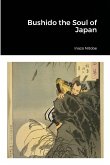Nitobe wrote a great deal. He was the author of numerous works, both for academics and the general public (see below). Not only that, but he peddled hundreds of articles to widely read newspapers and magazines. Nitobe wrote Bushido: The Soul of Japan (1900), initially publishing it in English for Western readers, as a seminal work on samurai ethics and Japanese culture. Later, translators translated it into Japanese and numerous other languages. Nitobe's other works also garnered attention from Western audiences. Japanese scholars like Inoue Tetsujiro and Tsuda Sokichi [ja] were among those who criticized or dismissed Bushido: The Soul of Japan, which led to a significant difference in its reception and impact between Japan and the West. The most widely distributed work on the subject of bushido, Bushido: The Soul of Japan, did not achieve its peak of popularity in Japan until the 1980s. The book Bushido: The Soul of Japan has been a bestseller in the West since the beginning of the Russo-Japanese War in 1904-05. Among the many notable foreigners who read it were Robert Baden-Powell, the founder of the Boy Scouts, US Presidents Theodore Roosevelt and John F. Kennedy, and many more. It suggested to H. G. Wells a solution to "solve the problem of combining progress with political stability." Some have said that the book shows samurai in a Western chivalric light, which is at odds with the pre-Meiji era bushido, which was a code of conduct for warriors that prioritized honor above all else. Regardless, this book was an innovative one.
Hinweis: Dieser Artikel kann nur an eine deutsche Lieferadresse ausgeliefert werden.
Hinweis: Dieser Artikel kann nur an eine deutsche Lieferadresse ausgeliefert werden.









